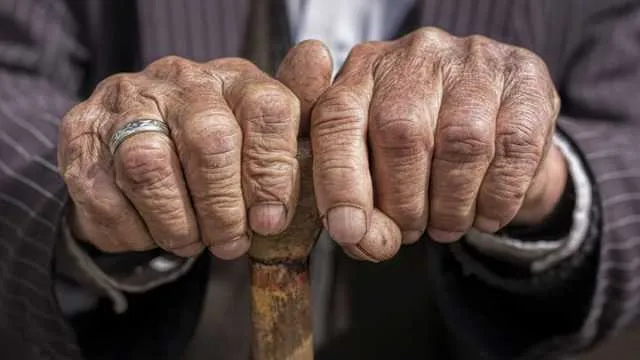
- Share on Facebook108
- Share on Pinterest
- Share on Twitter
Imagine living to see the birth of motion pictures, the invention of the automobile and the airplane, computers and the world wide web. For Mbah Gotho, he doesn’t have to imagine it — he’s lived it. Gotho is reportedly the oldest person in the world and has just celebrated his 146th birthday. But could he really be that old, and if so, how did he achieve it?
Is it even possible for humans to live that long?
Celebrating your 146th birthday is unquestionably a celebration of every milestone that led you down the road to longevity. Yet, Gotho’s age begs the question: Is it even possible for humans to live that long? Well, clearly, they can. That is, if you believe Gotho is as old as he and his family claim he is. Ask Dr. Aubrey de Grey, a researcher on aging, and his answer would be an emphatic “Yes!” The doctor says he’s developed a roadmap to defeat biological aging. He’s also proposed that the first human beings who will live to 1,000 years old have already been born.
However, a 2016 study published in Nature says otherwise. Human life expectancy has increased greatly since the nineteenth century — through genetic or pharmaceutical intervention. Still, researchers say that humans most likely won’t live past the age of 125 years, even with medical advancements. After analyzing global demographic data, they found that the survival rate declined after age 100. They also say that the age at death has not increased since the 1990s.
Other research points towards certain genes that, when switched off, could potentially extend human life by decades. A study from the Buck Institute for Research on Ageing and the University of Washington has identified 238 genes. By silencing these genes, researchers could increase the lifespan of yeast cells. Many of these same genes are also present in humans. That means by “turning them off,” we could dramatically increase our longevity.
In fact, researchers found that by deleting a certain gene (LOS1) life could be extended by 60 percent. LOS1 is apparently linked to a genetic master switch, which has long been associated with calorie restriction through fasting and increased lifespan. While it may not be 1000 years, relative to how long we live today (on average) that could see some humans reaching the ripe old age of 130 years. So, if Gotho was actually born in 1870, as his documentation claims, how did he reach that age without genetic manipulation?
How has the world’s oldest man achieved longevity?

The key to his longevity, says Gotho, is “patience.” And, he may very well be right. Research from Duke University Medical Center explains why stress damages DNA and, in turn, shortens lifespan. The study showed that chronic stress and elevated adrenaline could eventually cause DNA damage that is detectable. Mice were infused with an adrenaline-like compound that works through a receptor called the beta-adrenergic receptor. The scientists found that induced chronic stress triggered certain biological pathways. They ultimately resulted in the accumulation of DNA damage. This suggests that chronic stress can lead to a variety of human conditions and disorders. Those conditions could range between graying hair to more life-threatening diseases, like cancer.
But, sadly, stress is an unavoidable condition that plagues most humans. Each generation has its own set of stressors, making it almost impossible to live a stress-free life. However, the key is to learn how to manage your stress so that it doesn’t become chronic. While Gotho may certainly be living a less stressful life in Indonesia, more than likely he’s learned the art of managing his stress by being “patient.”
Diet, lifestyle or genetic makeup?
You would assume that someone living for 146 years would have an incredibly healthy diet and lifestyle — but you’d be wrong. Photos of Gotho show him eating ice cream and smoking cigarettes. So, clearly, his longevity has more to do with his own genetic makeup than what he’s actually putting into his body.
But, that’s not surprising. Although the local government has confirmed Gotho’s documentation, his age hasn’t officially been authenticated. Therefore, we cannot positively conclude that he is, in fact, the oldest living human. After Gotho, Emma Morano is the oldest living person that’s been proven thus far. At 116, she is still a few years off from Gotho’s age.
This leads us to Jeanne Louise Calment, who was born on February 21, 1875, in France. Calment lived to the fully authenticated age of 122 years and 164 days, according to the Guinness Book of World Records. Like Gotho, Calment smoked cigarettes. In fact, she smoked from the age of 21 and only quit when she was 117. When it came food, like many Mediterranean people, Calment enjoyed a diet rich in olive oil. She even rubbed it into her skin. Every now and then she enjoyed a glass of wine, but her real indulgence was chocolate. Apparently, Calment ate over two pounds of chocolate a week.
Remarkably, she lived on her own until the age of 110. And she was able to walk on her own until one month before her 115th birthday, when she fell and fractured her femur. After that, she needed a wheelchair to get around.
Diet for longevity

Overall, the average American lives about 78 years. But a “Mediterranean” diet rich in whole grains, vegetables, fruits, legumes, nuts, fish and olive oil may extend life beyond those years. Research published in BMJ found that eating these foods regularly appears to be associated with longer telomere length, which is linked slower aging. Just like the small plastic tips on the end of shoelaces, telomeres are found on the ends of chromosomes.
Telomeres prevent chromosomes from fraying and scrambling the genetic codes they contain, say geneticists. These bits of genetic material naturally shorten with age. But they also tend to shorten at a slower rate in people who are healthy. So, if you want to extend your life, consider first what you’re putting into your mouth.
A Mediterranean diet filled with antioxidants and anti-inflammatory foods (that are unrefined and preferably organic and non-GMO) could be a key to your longevity. And for those who have a sweet tooth, follow Calment’s lead and eat chocolate. But stick with a good-quality dark chocolate. Your gut will thank you and turn that chocolate into anti-inflammatory compounds that can benefit your health in several ways.
A blessing or curse?
For some people, the thought of living 146 years would be a blessing. Yet, for others, the thought of outliving your children and eventually all of those whom you love and cherish would feel more like a curse. Meanwhile, Gotho began preparing for his death in 1992 — gravestone and all. Yet, 24 years later, he’s still alive. Not surprisingly, Gotho has outlived all his children, his 10 siblings and his four wives.
Today, Gotho mostly listens to the radio. His eyesight is too poor to watch television. In the past three months, his body has also become increasingly frail, making it impossible for him to bathe, dress and feed himself. For his birthday, Gotho has one wish: “What I want is to die,” he said.
— Katherine Marko
- Share on Facebook108
- Share on Pinterest
- Share on Twitter

